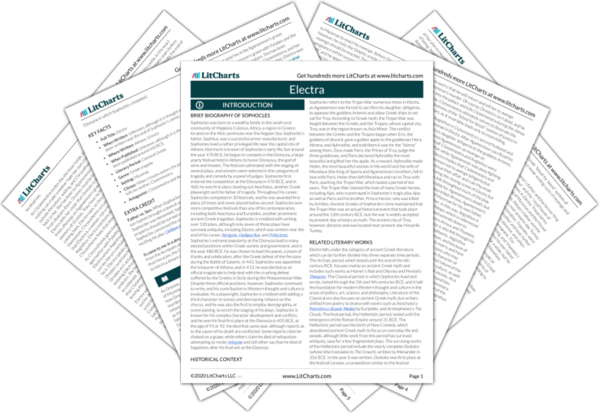Electra compares herself to the nightingale multiple times throughout Sophocles’s Electra, and the bird is symbolic of Electra’s mourning throughout the play. Additionally, the nightingale also symbolizes Electra’s ultimate freedom from the limitations of a sexist society. Early in the play, Electra claims that her grief will never cease “like the nightingale,” which is a reference to the mythological figure Procne. Procne murdered her own son, Itys, as revenge for the rape of her sister, Philomela, by Procne’s husband, Tereus. After murdering her son, Procne was transformed into a nightingale, and she is the quintessential figure of grief within ancient Greek literature. By comparing herself to Procne, Electra describes the severity of her grief and suffering, and makes it clear that it will not end simply because societal norms of grief say that it should. As birds are often associated with freedom, Electra’s comparison of herself to the nightingale also demonstrates that her actions during the play are geared not just toward revenge, but toward liberating herself from societal constraints. Throughout the play, Electra is imprisoned, oppressed, and abused simply because she is a woman; however, Electra refuses to conform to society’s expectations that she should be weak and incompetent, and by the end of the play she is effectively free from the imprisonment and abuse of Aegisthus and Clytemnestra. The chorus even says in the final scene that Electra has been “forced […] out / Into freedom.” Thus, as the play progresses the nightingale comes to symbolize Electra in new and more positive ways.
The Nightingale Quotes in Electra
Lines 86-120 Quotes
But I shall never
End my dirges and bitter laments
While I still see the twinkling,
All-radiant stars and the daylight,
Nor cease to keen like the nightingale
Who killed her young, crying my sorrow
To the world here by the royal gateway.










